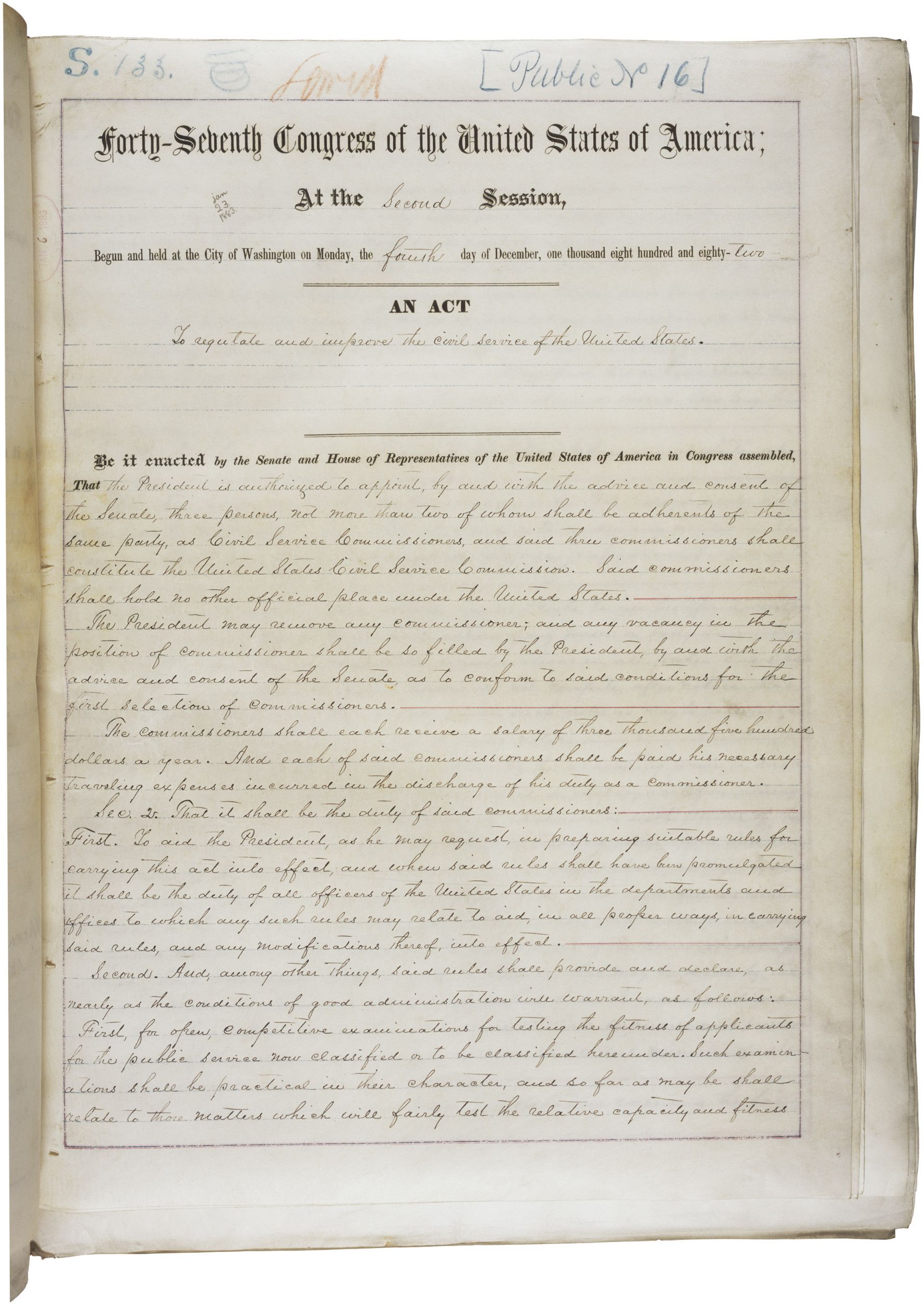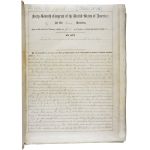The Pendleton Act
1/16/1883
Add to Favorites:
Add all page(s) of this document to activity:

Add only page 1 to activity:
Add only page 2 to activity:
Approved on January 16, 1883, the Pendleton Act established a merit-based system of selecting government officials and supervising their work.
Following the assassination of President James A. Garfield by a disgruntled job seeker, Congress passed the Pendleton Act in January of 1883. The act took its name from long-time reformer Senator George Hunt Pendleton of Ohio and was signed into law by President Chester A. Arthur, who had become an ardent reformer after Garfield’s assassination.
The Pendleton Act provided that federal government jobs be awarded on the basis of merit and that government employees be selected through competitive exams. The act also made it unlawful to fire or demote for political reasons employees who were covered by the law. The law further forbade requiring employees to give political service or contributions. The Civil Service Commission was established to enforce this act.
Although President George Washington based most of his federal appointments on merit, subsequent presidents deviated from this policy. By the time Andrew Jackson was elected president in 1828, the "spoils system," in which officials rewarded political friends and supporters with government positions, was in full force.
The term "spoils system" derives from the phrase "to the victor go the spoils." The flaws and abuses in this system worsened as candidates required political appointees to spend ever more time and money on political activities. The rapid expansion of the federal bureaucracy emboldened job seekers to hound the president-elect. In Jackson’s time, there were approximately 20,000 federal employees. By 1884, there were over 130,000. Additionally, federal jobs became more specialized and required special and specific skills due to industrialization.
The Pendleton Act transformed the nature of public service. Today many well-educated and well-trained professionals are federal employees. When the Pendleton Act went into effect, its hiring reforms covered only 10 percent of the government’s 132,000 employees. The law's scope has broadened over the years, however, and today it applies to most of the 2.9 million positions in the federal government.
Following the assassination of President James A. Garfield by a disgruntled job seeker, Congress passed the Pendleton Act in January of 1883. The act took its name from long-time reformer Senator George Hunt Pendleton of Ohio and was signed into law by President Chester A. Arthur, who had become an ardent reformer after Garfield’s assassination.
The Pendleton Act provided that federal government jobs be awarded on the basis of merit and that government employees be selected through competitive exams. The act also made it unlawful to fire or demote for political reasons employees who were covered by the law. The law further forbade requiring employees to give political service or contributions. The Civil Service Commission was established to enforce this act.
Although President George Washington based most of his federal appointments on merit, subsequent presidents deviated from this policy. By the time Andrew Jackson was elected president in 1828, the "spoils system," in which officials rewarded political friends and supporters with government positions, was in full force.
The term "spoils system" derives from the phrase "to the victor go the spoils." The flaws and abuses in this system worsened as candidates required political appointees to spend ever more time and money on political activities. The rapid expansion of the federal bureaucracy emboldened job seekers to hound the president-elect. In Jackson’s time, there were approximately 20,000 federal employees. By 1884, there were over 130,000. Additionally, federal jobs became more specialized and required special and specific skills due to industrialization.
The Pendleton Act transformed the nature of public service. Today many well-educated and well-trained professionals are federal employees. When the Pendleton Act went into effect, its hiring reforms covered only 10 percent of the government’s 132,000 employees. The law's scope has broadened over the years, however, and today it applies to most of the 2.9 million positions in the federal government.
Transcript
An act to regulate and improve the civil service of the United States.Be it enacted by the Senate and House of Representatives of the United States of America in Congress assembled, That the President is authorized to appoint, by and with the advice and consent of the Senate, three persons, not more than two of whom shall be adherents of thc same party, as Civil Service Commissioners, and said three commissioners shall constitute the United States Civil Service Commission. Said commissioners shall hold no other official place under the United States.
The President may remove any commissioner; and any vacancy in the position of commissioner shall be so filled by the President, by and with the advice and consent of the Senate, as to conform to said conditions for the first selection of commissioners.
The commissioners shall each receive a salary of three thousand five hundred dollars a year. And each of said commissioners shall be paid his necessary traveling expenses incurred in the discharge of his duty as a commissioner.
SEC. 2. That it shall be the duty of said commissioners:
FIRST. To aid the President, as he may request, in preparing suitable rules for carrying this act into effect, and when said rules shall have been promulgated it shall be the duty of all officers of the United States in the departments and offices to which any such rules may relate to aid, in all proper ways, in carrying said rules, and any modifications thereof; into effect.
SECOND. And, among other things, said rules shall provide and declare, as nearly as the conditions of good administration will warrant, as follows:
First, for open, competitive examinations for testing the fitness of applicants for the public service now classified or to be classified here- under. Such examinations shall be practical in their character, and so far as may be shall relate to those matters which will fairly test the relative capacity and fitness
[pages ommitted]
provision of the four foregoing sections shall be deemed guilty of a misdemeanor, and shall, on conviction thereof, be punished by a fine not exceeding five thousand dollars, or by imprisonment for a term not exceeding three years, or by such fine and imprisonment both, in the discretion of the court.
Approved, January sixteenth, 1883.
This primary source comes from the General Records of the United States Government.
National Archives Identifier: 5730369
Full Citation: An Act of January 16, 1883, Public Law Number 16, 22 STAT 403, An Act to Regulate and Improve the Civil Service of the United States; 1/16/1883; Enrolled Acts and Resolutions of Congress, 1789 - 2011; General Records of the United States Government, Record Group 11; National Archives Building, Washington, DC. [Online Version, https://www.docsteach.org/documents/document/pendleton-act, April 23, 2024]Rights: Public Domain, Free of Known Copyright Restrictions. Learn more on our privacy and legal page.


